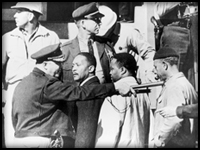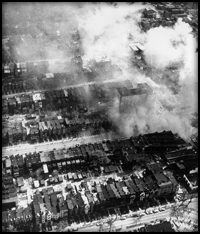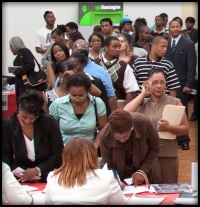-
Black History Month 2012,Part II - Angry But Pragmatic
February 7, 2012
Have an opinion? Add your comment below. Why Many African-Americans Aren't Celebrating
-
In this, the second in our current series celebrating Black History Month 2012, we want to reflect on the notion that as African-Americans, we're still angry. We're still not satisfied, but we're older and smarter. We're angry but pragmatic. Though Dr. Martin Luther King Jar's cherished utopia has not yet arrived for most of us, it seems considerably less remote than it did just a few years ago. Even with the election of America's first Black President, Barack Obama, there is less reason to celebrate. While the current weak economy has made bigger dreams seem less likely, a strong resurgence of black self-confidence and self-determination has made the realization more probable.

Optimistically, once the economy turns around, things could improve rapidly. Still it would be a mistake to assume that today's progress has brought good tidings to all African-Americans.
They have not. More Black men than ever still languish in prisons. Black academic achievement still lags that of whites. And suicides among young black men have risen sharply, reflecting a deep "sense of hopelessness." Fear is pervasive that an economic downturn, such as we're currently experiencing, could wipe out Blacks' tenuous gains.
What you also might not know is that Black history had barely begun to be studied, or even documented, when the tradition originated. Although African-Americans have been in America at least as far back as colonial times, it was not until the 20th century that we gained a respectable presence in the history books. The roots of the problem are varied, obscure and a touchy subject.
About 100 years ago, there was a deepening racial chasm that launched an extraordinarily violent and repressive era in America. It was a time when some state legislatures in the North and South were controlled by members of the Ku Klux Klan. It was a period when groups of respectable white Southerners gathered to burn black men in public, brought their children to watch, and mailed their loves ones souvenir postcards of the smoldering corpses. It was a time when African-Americans lost the right to vote to a white South determined to control their lives and labor by any means necessary.
Governments, at every level, remembering who chose them are loathe to broach the subject in any meaningful way. Textbook writers, daring not to bite the hand that feeds them, venture very few, if any words about slavery and its effect on America in the 21st century.

Democrats, progressives, Christians and their liberal cohorts who wish to eliminate it stitch their mouths for fear of being labeled what they really are … "liberals." Republicans, conservatives and the Christian right turn a blind eye to it and imply that the laws and decrees enacted in the 20th century eliminate it; therefore, they believe that any discussion grates the nation's general tranquility and is without merit.
The history books also largely ignored the black American population. When blacks did figure into the picture, it was generally in ways that reflected the inferior social position we were assigned at the time. And so with that brief background, we pick up the celebration with the struggle.
Fear & The Gap Between The Races

We are a society that steadfastly refuses to draw upon history until presented with a crisis or an election that jolts our memory and brings us face-to-face with our past. In the 1960s, large enclaves of African-Americans, poor and middle class in cities like Los Angeles, Detroit, Chicago, Baltimore, Washington DC and other American megalopolises found themselves marginalized and surrounded by affluence to the level of decadence. These frustrated citizens, most of them law abiding, used the death of Dr. Martin Luther King Jr. and police brutality as excuses to self-destruct and ignite conflagrations seen around the world.
These infernos blazoned the skies with cries for help until order was restored. They were trying to say nobody cared. These were ugly, gnarled, very private public hairs our political leaders would go to any lengths to hide. These enclaves still exist in 2012, only poorer (middle class Blacks, having the wherewithal, have departed) larger and more isolated.
Statistics show that African-Americans have made progress on many fronts: in education, health and finance. But they also indicate that blacks still lag white Americans in many important ways. Socioeconomic factors put blacks at greater risk for failure but we're gaining ground. In spite of this with better medical care, blacks are living longer and having healthier children.
Despite the progress we have made, one of the biggest obstacles African-Americans face in 2012 is fear. Fear extends the gap between the races. Fear is a primary obstacle that prevents people from becoming entrepreneurs. Many of us are not living our dreams because we are living our fears. Fear is a disease that cripples effective decision making and often accounts for the illogical actions that ensue.
America is now deep into a historic financial crisis that has many in fear of losing their jobs, healthcare and life savings. Learning to manage our fears can help us to weather negative situations during hard times.
A lot of people fear a personal lack of knowledge. While not everyone is an expert in public relations, sales and marketing, accounting, law, production and distribution, these seemingly lofty skills can be learned or contracted.

One of our greatest fears in 2012 continues to be unemployment. Although it's finally beginning to inch downward, the painful truth is that African-American employment remains at a crisis level. While the overall economic forecast appears to be improving each month, for the last year, the official national unemployment for the first time in more than two years is at 8.3%. There are more than 13.7 million unemployed in America. Black unemployment persists in double-digits – above 15.%. For black teens the rate is more than 40%.
Children in our communities are three times likely to be poor as white children, according to the 2010 US Census report. More than 40% of African-American children are born in poverty. Economically impoverished children given an inadequate education are a formula not only for acute unemployment, they are also a recipe for prolonged social misery, unjust imprisonment and intractable poverty.
President Barack Obama said recently, "Our top priority right now has to be creating new jobs and opportunities in a fiercely competitive world." We agree with the stated priorities of the President. That challenge, however for the African-American community is to increase meaningful and productive job creation for African-Americans and others ahead of the current pace of increased employment because of the disproportionate high unemployment in our community.
These are some of the reasons we're not celebrating in 2012. And yes, we're still angry, but pragmatic. We've learned it is better to understand what happened in the past, than it is to draw easy lessons for the future. We cannot go back and change history and yet, as William Falkner observed, "The past is never dead. It's not even past."
Word.
-
-
